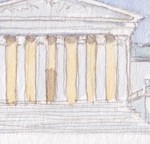
The Petitions of the Week column highlights some of the cert petitions recently filed in the Supreme Court. A list of all petitions we’re watching is available here.
Federal agents arresting someone on serious drug charges — those punishable by over one year in prison — can also seize any assets, such as cash, cars, or even homes, related to those charges. When those assets actually belong to someone else, federal law provides a 30-day window for third parties with an interest in property seized in connection with drug charges to file paperwork demanding its return. This week, we highlight petitions that ask the court to consider, among other things, whether that 30-day deadline bars owners from reclaiming property if they file with a missing signature.
Luis Sanchez is a part-owner of a small business in Florida selling electronics to Latin American customers. As payment for some computer accessories that she had already purchased, Jaqueline Palacios, who owns a small computer company in Bolivia, sent Sanchez $9,000 in cash with a courier to the United States. Unbeknownst to her, however, that courier was carrying more than money. He was arrested at the Miami airport with illegal drugs. Despite the courier’s protests that the cash was neither his nor connected to any narcotics, federal agents seized it along with the drugs.
Within 30 days of being notified that their money was now in the government’s hands, Sanchez and Palacios went to court seeking its return. Both signed affidavits explaining that the money belonged to them and had been sent as payment for legal electronics, not drugs. But the petition they filed was missing a signature for Palacios, who — because she lives in another country and speaks limited English — had only signed the accompanying affidavit.
A federal district court in Florida tossed their paperwork, given the requirement in the federal drug statute that third-party petitions to reclaim seized assets “be signed by the Petitioner under penalty of perjury.” Palacios then asked for permission to refile with her signature added. But because the 30-day deadline had by then passed, the court refused.
The U.S. Court of Appeals for the 11th Circuit affirmed that decision. In a previous ruling, the court of appeals had concluded that the 30-day statutory deadline is mandatory, with no room for flexibility. Based on that ruling, and looking to Supreme Court decisions rigidly construing similar statutory deadlines, the 11th Circuit held that Sanchez and Palacios were out of luck. The two business owners, the lower court ruled, must forfeit the $9,000.
In Sanchez v. United States, Sanchez and Palacios ask the justices to grant review and reverse the 11th Circuit’s ruling. They argue that the courts of appeals are divided over whether the 30-day deadline is so inflexible as to bar the correction of small errors. The 11th Circuit’s position on that question, they write, “raises a host of troubling constitutional questions” by allowing the government to “seize private property” without first proving its connection to a crime “and then insulate itself from accountability through a small and readily correctible pleading deficiency.”
A list of this week’s featured petitions is below:
No on E, San Franciscans Opposing the Affordable Housing Production Act v. Chiu
23-926
Issues: (1) Whether requiring political advertisers to name their donors’ donors within their advertisements advances any important or compelling state interest; and (2) whether San Francisco’s secondary donor speech mandate violates the First Amendment freedoms of speech and association.
Henning v. Snowden
23-976
Issue: Whether the court of appeals erred in allowing a remedy under Bivens v. Six Unknown Named Agents of the Federal Bureau of Narcotics in this case, where the claim arises from an arrest made outside the home, in a place open to the public, pursuant to a warrant.
Mendoza v. Lumpkin
23-1004
Issues: (1) Whether a federal claim is “adjudicated on the merits” in state court under 28 U.S.C. § 2254(d) so long as the state court resolves the claim on substantive grounds, even if the petitioner did not have a full and fair opportunity to litigate the claim; and (2) whether the U.S. Court of Appeals for the 5th Circuit erred in denying habeas relief on petitioner’s claim that his trial lawyers provided ineffective assistance by presenting a psychologist at the capital-sentencing phase who testified that petitioner lacked a moral compass, was a danger in and out of prison, and that the traditional mitigation factors were not present.
Cunningham v. Cornell University
23-1007
Issue: Whether a plaintiff can state a claim by alleging that a plan fiduciary engaged in a transaction constituting a furnishing of goods, services, or facilities between the plan and a party in interest, as proscribed by 29 U.S.C. § 1106(a)(1)(C), or whether a plaintiff must plead and prove additional elements and facts not contained in the provision’s text.
Sanchez v. United States
23-1050
Issue: Whether a timely filed 21 U.S.C. § 853(n) petition may be amended to cure a pleading deficiency after the 30-day filing period has run, or whether Section 853(n)(2)’s 30-day deadline for filing a petition precludes any amendment after the filing deadline has expired.
The post Business owners seek to reclaim cash seized in drug bust appeared first on SCOTUSblog.


